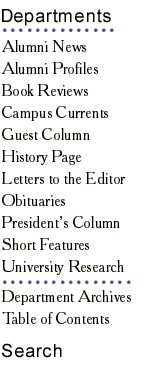

|
 Cover photo by Doug Prince 
|
Fire from the Sky That ended that. But there were more sinister things. One day the same young man asked if our parents at home complained about the new regime. No one said anything this time. When I told my mother what happened, she informed me, in no uncertain terms, that she would kill me if I ever opened my mouth. In any case, she did not take any chances. Anytime I walked into a room, the grown-ups would shut up and eye me suspiciously. I had plenty to be guilty about, and it must have shown on my face, for there would be a long cross-examination: "What did you tell them?" "Nothing! I swear it!" And so it went. My mother was stubborn. She found someone who knew a reliable person who, for a price, could take us across the border into Austria. I was told nothing. I was under the impression that we were going to spend our summer vacation in the mountains of Slovenia. Again, we found ourselves in an elegant, half-empty chalet, sleeping late and taking long mountain walks. One evening we walked farther than was our custom. We sat on a couple of rocks in the woods, and my mother told me that this was the night we'd be going to my father. It was almost pitch-dark when a man came to take us to a farmhouse, where two armed men waited. The rest of the night we spent climbing the mountains, with my mother carrying my infant brother in her arms. They had given him something so he would sleep. We had to be absolutely quiet, even when we took brief rests. We couldn't see much for most of the way. The moon only came out when we crossed the border in the wee hours. We were on the side of a hill, and Yugoslavia was down below. We sat on the grass and had our first talk of the night, and the men smoked. This was a mistake, as it turned out. We heard someone shout something in German. One of our guides leapt to his feet and opened fire, and the two of them took off in the direction of Yugoslavia, leaving us alone. After a long while there was another shout in German. This time my mother replied, and soon enough they came out of the trees. We were in the hands of the American-Austrian border patrol, and that cheered us up tremendously.
Our problems started when the Americans handed us over to the English army, whose zone of occupation this was. A colonel sternly asked my mother for our passports. My mother laughed. After our all-night mountain hike our clothes were in tatters, and our hands and faces were covered with scratches. My mother then tried a bit of humor. She told him, in the best English she could summon, that if we had our passports we would have surely taken a sleeping car. The fellow was not amused. All her explanations fell on deaf ears. What he did then--and it came to us as a big surprise and horror--was to drive us to the border and hand us over to the Yugoslav border guards. He saluted, they saluted, and we were back in Yugoslavia and under arrest. We didn't know, of course, that this kind of thing happened often. The English were sending back Russian POWs and anybody else from Eastern Europe they got their hands on. People begged, threw their children off the trains, committed suicide. The English didn't care what happened. Their pal Stalin packed everybody off to the labor camps, where, of course, many perished. Our case was not so tragic.We were transported from prison to prison for the next two weeks, until we reached Belgrade. In Belgrade my brother and I were released into the hands of my grandmother, and my mother was kept in prison for another four months. Her defense was that she simply wanted to be with her husband and was not given the legal means to do so. This was true enough, although probably not the reason why they let her go with such little fuss. The jails at that time were full of people with more interesting political transgressions. We were small fry. At home, all the relatives and friends were waiting to hear what happened. I reenacted the gunfight and the beatings of my mother for the benefit of all those grim and weary faces, night after night, inventing more and more fantastic details, until eventually they began to laugh at me, and I stopped. ~ This excerpt is adapted with permission from A Fly in the Soup [© University of Michigan Press, 2000]. Charles Simic is a poet, essayist, translator and editor. He is the author of more than 60 books, including Walking the Black Cat, which was nominated for a National Book Award, and The World Doesn't End: Prose Poems, for which he received the Pulitzer Prize. His work has been recognized by the Guggenheim Foundation, the MacArthur Foundation and the National Endowment for the Arts. He has been a professor of English at UNH since 1973.
See also: Easy-to-print version Return to Spring '01 features blog comments powered by DisqusCurrent issue | Past issues | Class notes Department archives | Send a letter/news | Address updates Advertise | About UNH Magazine | Alumni home | UNH home University of New Hampshire Alumni Association 9 Edgewood Road Durham NH 03824 (603) 862-2040 alumni@unh.edu |